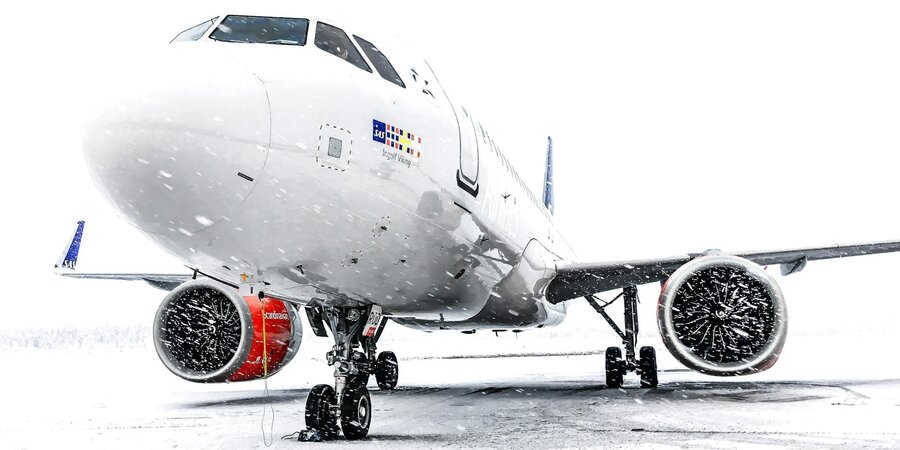Aviation Law
November 25th, 2024
The latest German Federal Court of Justice (BGH) ruling of September 24, 2024, Case No. X ZR 136/23, addresses the airline’s liability toward passengers in the event of a flight cancellation due to extraordinary circumstances. Specifically, the court examined whether the defendant airline is obligated to pay compensation under Regulation (EC) No. 261/2004 after canceling a flight due to a snowstorm.
Case Overview
The plaintiff is demanding compensation from the airline under Regulation (EC) No. 261/2004 through assigned rights. The passengers had booked a flight from Stuttgart to Hamburg on February 27, 2020, at 6:15 p.m., which was canceled by the airline due to a snowstorm in Stuttgart. This weather event led to delayed slots from air traffic control at Stuttgart Airport, causing substantial delays throughout the airport. With specific reference to this flight route, the airline canceled the rotation as weather conditions on preceding flights and resulting slot delays, combined with flight restrictions due to night curfews, prevented timely operation of the Hamburg flight. This decision was made to ensure that the aircraft could carry out its scheduled flights from Stuttgart the next day. As a result, passengers arrived in Hamburg with a 12 hour, 44 minute delay. The district court initially awarded the plaintiff EUR 250 in compensation, but the appellate court dismissed the claim, prompting the plaintiff to file an appeal.
BGH Legal Reasoning
The BGH rejected the plaintiff’s appeal and upheld the appellate court’s decision, exempting the airline from compensation due to extraordinary circumstances. The ruling is based on Article 5(3) of Regulation (EC) No. 261/2004, which allows airlines to deny compensation in extraordinary circumstances.
The BGH determined that a snowstorm qualifies as an extraordinary circumstance under passenger rights law, as severe weather can lead to delays due to ATC-slot restrictions. Furthermore, the BGH specified that the disruptive effects of the snowstorm, which already caused delays for previous flights, may also be considered for later flights, as long as there is a direct link between the extraordinary circumstance and the cancellation. Airlines may invoke extraordinary circumstances when deciding to cancel certain flights to avoid further delays across the entire schedule. Accordingly, the judges not only consider the individual flight but the entire airline’s flight schedule. The ruling explicitly states, “An airline is not required to operate all scheduled flights without regard for consequences as long as they are feasible; instead, it may seek ways to minimize disruptions caused by extraordinary circumstances on the affected aircraft’s operational mode.”
The court emphasized that airlines have discretion in canceling flights when extraordinary circumstances arise. This includes taking measures to minimize disruption to subsequent flights. Consequently, the BGH found the airline’s decision to cancel the Hamburg flight and the return to Stuttgart reasonable to enable scheduled flights to operate punctually the following day. Additionally, the BGH accepted the airline’s evidence of providing alternate transportation the next day to deny compensation under Regulation (EC) No. 261/2004.
Assessment
This ruling is beneficial for airlines, as it clarifies the conditions for liability exemption under Regulation (EC) No. 261/2004 in extraordinary circumstances and defines airlines‘ defense options in such situations. The BGH decision grants airlines some flexibility regarding cancellations when extraordinary circumstances are present, emphasizing their ability to address future impacts on their flight schedules.
- 1. Exemption from Liability for Extraordinary Circumstances
- Article 5(3) of Regulation (EC) No. 261/2004 provides that airlines are exempt from compensation obligations when unavoidable extraordinary circumstances arise, even if all reasonable measures were taken. The BGH clarifies that a snowstorm constitutes an extraordinary circumstance if it directly impacts flight operations, as it did here by delaying ATC slots. Extraordinary circumstances are determined by natural events and weather, such as snowstorms or strong winds, which cause delays and disruptions that cannot be avoided through reasonable precautionary measures. Additionally, capacity restrictions at airports and slot management disruptions are relevant factors in these cases; airlines are dependent on assigned ATC slots, which can be heavily impacted, quickly affecting the entire schedule and preventing timely flight operations.
- 2. Discretion in Cancellations
- The BGH ruling highlights that airlines have a degree of discretion when extraordinary circumstances disrupt operations. This is critical for airlines needing to respond swiftly in crisis situations, such as snowstorms or natural disasters, to mitigate further operational disruptions. In this case, the airline canceled the Hamburg flight and its return leg to Stuttgart to ensure the aircraft could depart punctually the next day. However, an airline cannot cancel flights simply to free up space for other passengers; this would be impermissible under Regulation (EC) 216/2004 and EU Court of Justice case law. The BGH emphasizes that airlines have a limited but essential discretion to stabilize operations under extraordinary circumstances.
The BGH applied the following assessment criteria:
- Proof of Extraordinary Circumstance: The airline must demonstrate that an extraordinary circumstance exists. In this case, the airline successfully showed that a snowstorm disrupted flights throughout the day.
- Link between Extraordinary Circumstance and Cancellation: A causal connection must exist between the extraordinary circumstance and the flight cancellation, especially when disruptions occur during earlier flights, forcing the airline to prioritize certain flights.
- Balancing and Minimizing Operational Impact: The airline must take reasonable measures to mitigate the impact of the circumstances on all passengers. The BGH highlights the need to consider the “operational mode” of the airline, meaning airlines may consider disruptions in the context of their overall operations.
- Feasibility of Alternatives: The airline must assess alternatives, such as re-routing passengers on other flights or deploying a replacement aircraft. In this case, the airline demonstrated that there were no faster travel options for passengers to reach Hamburg.
Conclusion
This ruling primarily addresses situations where extreme weather events affect overall flight operations. The scope of discretion focuses on unforeseen natural events impacting multiple flights. The BGH decision strengthens airlines’ positions by expanding their operational flexibility and discretion during extraordinary circumstances. The ruling reflects an understanding of airlines‘ „operational mode“ and clarifies the conditions under which airlines are exempt from compensation obligations. It acknowledges operational realities during major disruptions and provides airlines with valuable guidance for crisis management in similar situations, enabling them to stabilize operations and minimize the impact of extraordinary circumstances.
Source
Federal Court of Justice, 24.09.2024, file:. X ZR 136/23



